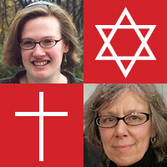Watch this hour-long presentation, linked here in 5 parts.
PART !: Introduction. Rachel and Elizabeth's backgrounds in blogging
and in interfaith dialogue. Rachel explains the Jewish Renewal movement, and talks about the tradition of midrash, which is the basis for her poems in "70 Faces: Torah Poems." Part 2: The book of GENESIS. The story of Abraham and Isaac. Rachel's poem:
"The Angels Say." The book of EXODUS. Poem: "The Psalm I Sing." Part 3. The Book of EXODUS, cont'd. Dealing with the idea of a vengeful God
who chooses sides. The Book of LEVITICUS. Poem: "Like God." Women and patriarchy. Creation. Rachel's poems about motherhood, and about miscarriage. The Book of NUMBERS. Poem: 'Downside." Part 4. Book of Numbers, cont'd. Thoughts about modern Israel and
Palestine. The Book of DEUTERONOMY. Poem: "Mobius." Questions and Answers. PART 5. Questions and Answers, continued. Rachel's "Talking Donkey"
poem and final blessing. |
Rabbi Rachel Barenblat is a Jewish Renewal rabbi who holds an MFA from the Bennington Writing Seminars. In addition to this first full-length collection, she is the author of four chapbooks of poetry. Since 2003, Rachel has blogged as The Velveteen Rabbi; in 2008 her blog was named one of the top 25 blogs on the internet by TIME. She is the author of the Velveteen Rabbi's Haggadah for Pesach, which has been used in homes and synagogues worldwide. (http://velveteenrabbi.blogs.com/blog/)
Elizabeth Adams is the founder of Phoenicia Publishing, a small independent publishing house in Montreal, and the author of Going to Heaven: The Life and Election of Bishop Gene Robinson. She is a lifelong Anglican and an active member of the congregation and choir of Christ Church Cathedral, and the author of The Cassandra Pages, a blog about art, life and spirit that has just entered its ninth year. (www.cassandrapages.com) On Sunday, May 8, Christ Church Cathedral of Montreal and Phoenicia Publishing hosted a book
discussion with Rabbi Rachel Barenblat, author of 70 Faces: Torah Poems, a
recently-published and highly-praised book of poems which approach
the five books of Moses from a questioning, modern perspective.
In addition to the issue of patriarchy in the Hebrew scriptures, Rachel's poems grapple with some of the most problematic texts in the Bible for modern readers: the story of Abraham and Isaac, the rigid rules of Torah Law, and the ancient and modern dispossession of land by the nation of Israel. As a longtime poet and writer, newly-ordained rabbi, and recent mother, Rachel's work helps us look at these texts from new and personal perspectives. How can modern women and men engage actively with these early Hebrew scriptures, while still loving and respecting the Bible and remaining faithful Christians and Jews? What does the tradition of midrash have to offer to Christians? How can poetry -- a tradition deeply embodied in the Hebrew Scriptures - free us to think and feel creatively about the human issues the Bible addresses in these stories? “These poems are so out there, so radical, and at the same time so gentle and inviting. Barenblat manages to do work that has
passion and truth behind it, without ranting. I love the simple and confident way she deals with the akedah* — and I love the final poem in this collection — gliding right past heart- break into renewal, which is what her poems all seem to do.” Alicia Ostriker, author of "For the Love of God: the Bible as an Open Book" and "The Book of Seventy" *The story of Abraham and Isaac |

